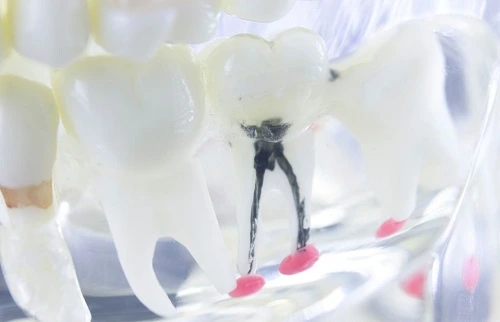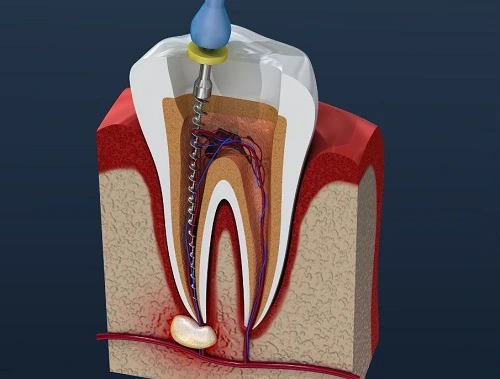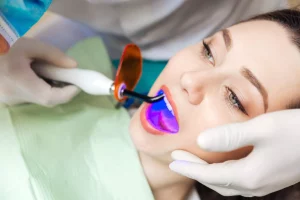Last Updated on: 12th December 2025, 08:39 am
In this article, you will discover the root canal symptoms and what are the recommendations to prevent it.
What is a root canal?

A root canal is a dental procedure that involves removing the infected pulp from a tooth and filling it with dental material. The pulp contains nerves and blood vessels that keep the tooth healthy, and when it becomes infected, it can lead to severe pain and discomfort. Root canal treatment is usually performed by an endodontist, a dentist who specializes in treating the inner parts of teeth, and it is a common procedure that is generally successful in saving the tooth and relieving pain.
What triggers your tooth that needs a root canal treatment?

Two main reasons can cause this damage:
1. Due to a cavity that has not been treated in time the infection reaches the dental pulp.
2. When the tooth has received a strong blow, whether it breaks or not, the tooth loses its vitality.
Common signs that you need a root canal
To recognize the need for a root canal, the person may manifest various signs of discomfort that can alert us. Generally, these discomforts or root canal symptoms are associated with caries. Depending on the degree of evolution of caries (size and depth), symptoms may appear from very weak pain or discomfort to very sharp or disabling pain accompanied by abscesses and even fever. Generally, the closer caries is to the tooth’s pulp or nerve, the more painful it is.
If a tooth needs a root canal and the treatment is not performed, an abscess may form due to germs’ entry into the pulp. The abscess can cause damage to the surrounding bone, and the tooth can be lost.
According to the American Association of Endodontists, the following are the six most common root canal symptoms:
1. Tooth sensitivity
Tooth sensitivity can indicate that the tooth enamel is worn down, but it can also be due to problems with decay or a fracture; in these cases, you may have a root canal symptom.
The level of tooth sensitivity that warrants a root canal is extreme. If you feel discomfort not only when drinking hot or cold beverages, but also suffer from hypersensitivity without even putting anything in your mouth, for example, cold wind, it is advisable that you schedule an appointment to take a look at it.
Tooth sensitivity without direct stimulus is a sign that you may need root canal treatment.
2. Chewing pain
Chewing should not represent any discomfort if your teeth are healthy. Therefore, the fact that it hurts to chew is an indication that there is a problem. Even if you cannot see any alteration in your teeth or gums with the naked eye, but you still feel pain or discomfort when you eat, you may need a root canal.
Even without chewing, there are cases in which people who need a root canal treatment experience sudden sharp pains in one of their teeth.
3. Darkening of dental piece
One of the most common causes you may need a root canal is after a trauma or a blow to one of your teeth.
It is possible that one of your teeth has broken and you didn’t realize it. If the trauma affected the tooth’s nerve, you will begin to notice discoloration changes in the tooth because the area is no longer receiving the same blood flow as before.
4. Gum inflammation
Root canal treatment is required when the root of the tooth is affected, as we already know, by decay or trauma. Being a problem in the pulp, it is usual that the gums or other soft parts surrounding the tooth become inflamed.
Inflammation in your gums may also indicate that you suffer from an infectious process in the root so you will need a root canal more urgently.
5. Having a strange taste
If there is an infectious process affecting the root of your tooth and it is not taken care of in time, the infection can create an abscess with pus that will generate a strange taste in your mouth and halitosis. Root canal treatment provides the ideal cleaning and treatment to overcome these two uncomfortable root canal symptoms.
If you experience any of these symptoms, it is important to see your dentist as soon as possible. Early intervention is key to successful treatment and preventing further damage to the tooth and surrounding tissues.
Prevention of root canal infection

Conclusion
Root canal treatment is an important dental procedure that can help to save a badly decayed or infected tooth. By recognizing the signs and symptoms of a tooth that may require root canal treatment, you can seek prompt dental care and avoid more serious complications. If you experience any of the symptoms listed above, be sure to schedule an appointment with your dentist as soon as possible
Contact us
If you have any questions about root canal symptoms or other topics, you can contact us at Channel Islands Family Dental as well as our page on Facebook. We look forward to your visit and we will make a timely diagnosis. Our dentists in Oxnard, Santa Paula, Ventura, Newbury Park, and Port Hueneme will be able to guide you toward the best treatment to take care of your health and give you back your best smile.
Bibliography
- 1. American Association of Endodontists. (2021). Root Canal Treatment. https://www.aae.org/patients/root-canal-treatment/
- 2. Mayo Clinic. (2021). Root Canal. https://www.mayoclinic.org/tests-procedures/root-canal/about/pac-20384631
- 3. WebMD. (2021). Root Canal Treatment. https://www.webmd.com/oral-health/root-canals














